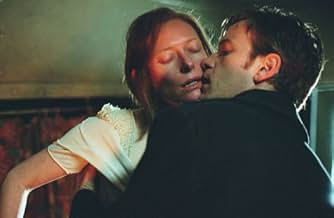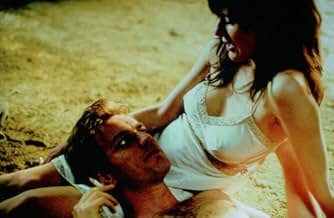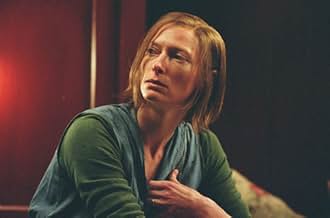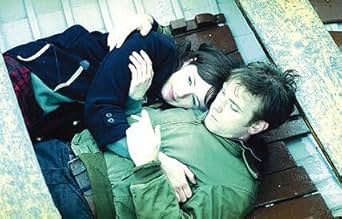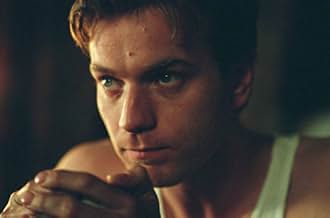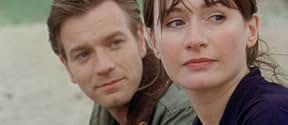CALIFICACIÓN DE IMDb
6.3/10
15 k
TU CALIFICACIÓN
Un joven vagabundo que trabaja en una barcaza fluvial interrumpe la vida de sus empleadores mientras oculta el hecho de que sabe más sobre una mujer muerta encontrada en el río de lo que adm... Leer todoUn joven vagabundo que trabaja en una barcaza fluvial interrumpe la vida de sus empleadores mientras oculta el hecho de que sabe más sobre una mujer muerta encontrada en el río de lo que admite.Un joven vagabundo que trabaja en una barcaza fluvial interrumpe la vida de sus empleadores mientras oculta el hecho de que sabe más sobre una mujer muerta encontrada en el río de lo que admite.
- Dirección
- Guionistas
- Elenco
- Premios
- 7 premios ganados y 17 nominaciones en total
- Dirección
- Guionistas
- Todo el elenco y el equipo
- Producción, taquilla y más en IMDbPro
Opiniones destacadas
Okay, this film isn't for everyone. A little dreary, a little bleak, and the love scenes weren't always attractive, but something in the dark simplicity got me.
McGregor is incredibly versatile, I didn't think once of the bohemian poet Christian, or of Obi Wan... he's taken on an unlikeable character with a slow moving plot and pulled it off beautifully.
Tilda Swinton plays the antithesis of a Hollywood seductress, which makes some of the love scenes uncomfortable, but refreshing. The acting, as a whole, is the entire film. The action between characters is subtle and intense, and although I may be biased as an Ewan fan, I thought it was perfect for a dark, rainy night!
McGregor is incredibly versatile, I didn't think once of the bohemian poet Christian, or of Obi Wan... he's taken on an unlikeable character with a slow moving plot and pulled it off beautifully.
Tilda Swinton plays the antithesis of a Hollywood seductress, which makes some of the love scenes uncomfortable, but refreshing. The acting, as a whole, is the entire film. The action between characters is subtle and intense, and although I may be biased as an Ewan fan, I thought it was perfect for a dark, rainy night!
The films focus on translating the novels first person perspective is clearly an obsession for this director. Never is the audiences attention allowed outside of Joe's point of view. We see only what he sees, we hear nothing more and we remember his life in little snatches, moments of dark disgusting and secret clarity he keeps from the world.
The film starts with a corpse, a barely dressed woman floating in the Clyde that is fished out by Joe; a young man working the barges for reasons that are not immediately clear. This brutal beginning in which we see Joe lay a tender hand on the cold dead flesh of the girl begins the film with a level of tension that rarely leaves the screen. Through his actions and - more importantly - his inactions we peel away the outer layers of a man on the run from himself, from responsibility and from guilt. We see him commit two murders by mission of inaction and we see him quietly dealing with that in one last lingering shot that tells us he will never change.
Joe is sexually driven to destroy life around him and he uses sex as a weapon against himself and against the possibility of settling or creating a future. He could be a writer, but he lacks the courage to read his own work. He could be a father, but he cannot face the thought of commitment. He could be a lover, but he makes love to women only as a means to an end, rejecting and pushing them away once the act is completed.
And this is the film in a nutshell. A relentless character study of an unpleasant man who punishes those around him for his own failings. Yes there is gratuitous sex in this film, but it has its place, it defines the moments of change in everyone else's lives while underlining the static character of Joe, played with utter brilliance by Ewen McGregor. The sex is cold, rather than erotic, reflecting the characters contempt for those he uses. Without the detailed sex scenes the film would be less than it is, but audiences expected to be titillated will come away disappointed.
Not without flaws this film has that perplexing title and a scene in which Joe beats his girlfriend after covering her with custard. The scene is alien to both the film and the character of Joe who gives no indication of being violent, rather a man that will walk out on a problem rather than face the awful possibility of confrontation. In fact Ewen McGregor seems embarrassed to play this scene, as though he too cannot link this outburst to the character he is playing.
But this minor quibble apart the film remains an artistically shot work, played with brilliance by everyone. Its rare to see a film where the whole cast are brilliant, where the script is clearly cut and the direction thought through. The visual aspect of the film is also tremendous with each shot being laid out in front of us like a painting, a wondrous work of art that moves and flows to show us the 60's post war Brittan with utter clarity.
Hollywood please take note.
The film starts with a corpse, a barely dressed woman floating in the Clyde that is fished out by Joe; a young man working the barges for reasons that are not immediately clear. This brutal beginning in which we see Joe lay a tender hand on the cold dead flesh of the girl begins the film with a level of tension that rarely leaves the screen. Through his actions and - more importantly - his inactions we peel away the outer layers of a man on the run from himself, from responsibility and from guilt. We see him commit two murders by mission of inaction and we see him quietly dealing with that in one last lingering shot that tells us he will never change.
Joe is sexually driven to destroy life around him and he uses sex as a weapon against himself and against the possibility of settling or creating a future. He could be a writer, but he lacks the courage to read his own work. He could be a father, but he cannot face the thought of commitment. He could be a lover, but he makes love to women only as a means to an end, rejecting and pushing them away once the act is completed.
And this is the film in a nutshell. A relentless character study of an unpleasant man who punishes those around him for his own failings. Yes there is gratuitous sex in this film, but it has its place, it defines the moments of change in everyone else's lives while underlining the static character of Joe, played with utter brilliance by Ewen McGregor. The sex is cold, rather than erotic, reflecting the characters contempt for those he uses. Without the detailed sex scenes the film would be less than it is, but audiences expected to be titillated will come away disappointed.
Not without flaws this film has that perplexing title and a scene in which Joe beats his girlfriend after covering her with custard. The scene is alien to both the film and the character of Joe who gives no indication of being violent, rather a man that will walk out on a problem rather than face the awful possibility of confrontation. In fact Ewen McGregor seems embarrassed to play this scene, as though he too cannot link this outburst to the character he is playing.
But this minor quibble apart the film remains an artistically shot work, played with brilliance by everyone. Its rare to see a film where the whole cast are brilliant, where the script is clearly cut and the direction thought through. The visual aspect of the film is also tremendous with each shot being laid out in front of us like a painting, a wondrous work of art that moves and flows to show us the 60's post war Brittan with utter clarity.
Hollywood please take note.
Who is Alexander Trocchi? He's the author of a Brit Beat cult novel called Young Adam and a fascinating figure of whose writing William S. Burroughs once said `He has been there and brought it all back.' Fledgling Scottish director David Mackenzie has brought it all back to the screen, having performed the difficult feat of getting adequate funds to film Young Adam and gathered an able cast headed by Ewan MacGregor, Tilda Swinton, and Peter Mullen to act in it.
A worthwhile project and a logical one for those involved. It makes sense that MacGregor of Trainspotting and Shallow Grave and Mullen of Trainspotting should try to jumpstart British cinema again by bringing this bold forgotten classic set in Scotland to the screen. The result may not be a revolution, but it's a good watch, a beautiful dark lusty little movie with some rare nooks and crannies to it.
Indeed it was Trainspotting author Irvine Welsh who spearheaded the revival of interest in Trocchi and his novel. Glasgow-born Trocchi (who died in '84) spent so many years as a wild drug intellectual figurehead in Paris, the US, and England that people had pretty much forgotten he'd been a good writer admired for his style and his "sexistential" plots.
Besides being a heroin-opium-cocaine-marijuana addict, pimp, magazine editor, translator and rare book seller who never gave up the wan hope that he'd do some good writing again, Trocchi once also penned pornography for cash. His own lust sticks out all over this story, as does his freewheeling sensualist nihilism.
The sexually predatory Joe (MacGregor) is a failed writer with a dark secret who's run off to become a hired hand on a barge running coal along the Forth and Clyde canal between Glasgow and Edinburgh. Ella Gault -- a typically powerful, merciless role for the bold and talented Swinton -- is the barge owner, often contemptuous of her husband Les (Peter Mullen). It's obvious Joe and Ella are going to be between the sheets in short order. We suspect also that as in Jean Vigo's classic Parisian barge film L'Atalante, somebody's going to have to leave. The small world is made even smaller by the presence of a son, `the kid' Jim (Jack McElhone) who peeks through cracks to see the humping. This is the Kitchen Sink School of adultery.
Before long Les gets the picture and moves off, but we know from flashbacks and concurrent affairs that Joe is a stranger to commitment. Eventually it emerges that he knew a lot more than he said about the body of the girl in the slip he and Les fished out of the canal at the movie's outset. The story that unfolds about that body and its owner is a huge example of Joe's endless capacity for non-commitment. Could it be there's more than a little of Alexander Trocchi in Joe Taylor? You bet. But Joe's a pre-drug Trocchi whose only substances are the alcohol he gets in pubs and the cigarettes he always has dangling from his mouth.
The lusty nihilism of this story may owe something to Henry Miller, but it's more usually described as a sensual and earthy version of Camus's The Stranger, and like The Stranger, Young Adam has a trial at the end (it seems somewhat patched in, and it is it's not in the book). Joe experiences greater priapic pleasure than Camus's Meursault. He doesn't seem to get a lot of fun out of it, though. He's a failed author making it with every woman who comes along to forget his writer's block and his guilt. He's a handsome, sexy devil who doesn't so much seduce women as look them in the eye and wait to pounce. It's hard to see how anybody else could be better than Ewan McGregor in this role. Working on home turf again for a change -- like Colin Farrell in the casual, quick-witted recent Irish film Intermission -- MacGregor has never looked or acted better. Swinton, Mullen, and Emily Mortimer (as the former girlfriend) are equally good.
Mackenzie's postwar Glasgow canal world is an authentic-feeling place where the interiors are chiaroscuro and exteriors bleached out and tinged with yellow. The shots are often striking in unexpected ways. The trouble with the movie is it isn't emotionally affecting. The wild sex scenes including the notorious ketchup rape -- are no more than bodies rudely colliding. There's more beauty in the arch of McGregor's eyebrows or the rust of a barge in the late sunlight. There's a grimy glamour also to the barge interiors, the luminous air of the pubs, canalside humps and slick dark streets; but the hero's aimlessness destroys momentum and the movie fizzles out at the end.
As Joe drifts through Young Adam the present is mixed with the flashbacks of an equally aimless past and things get a bit confusing. There isn't any of the acid trip intensity (and ultimate clarity) of Cronenberg's brilliant Spider and the pace drags at times. Let's hope Mackenzie's work on his next movie pans out: it's an adaptation of Spider author Patrick McGrath's novel Asylum. His first movie was a fiasco. This interesting effort is his second. With luck he may make another leap forward next time.
A worthwhile project and a logical one for those involved. It makes sense that MacGregor of Trainspotting and Shallow Grave and Mullen of Trainspotting should try to jumpstart British cinema again by bringing this bold forgotten classic set in Scotland to the screen. The result may not be a revolution, but it's a good watch, a beautiful dark lusty little movie with some rare nooks and crannies to it.
Indeed it was Trainspotting author Irvine Welsh who spearheaded the revival of interest in Trocchi and his novel. Glasgow-born Trocchi (who died in '84) spent so many years as a wild drug intellectual figurehead in Paris, the US, and England that people had pretty much forgotten he'd been a good writer admired for his style and his "sexistential" plots.
Besides being a heroin-opium-cocaine-marijuana addict, pimp, magazine editor, translator and rare book seller who never gave up the wan hope that he'd do some good writing again, Trocchi once also penned pornography for cash. His own lust sticks out all over this story, as does his freewheeling sensualist nihilism.
The sexually predatory Joe (MacGregor) is a failed writer with a dark secret who's run off to become a hired hand on a barge running coal along the Forth and Clyde canal between Glasgow and Edinburgh. Ella Gault -- a typically powerful, merciless role for the bold and talented Swinton -- is the barge owner, often contemptuous of her husband Les (Peter Mullen). It's obvious Joe and Ella are going to be between the sheets in short order. We suspect also that as in Jean Vigo's classic Parisian barge film L'Atalante, somebody's going to have to leave. The small world is made even smaller by the presence of a son, `the kid' Jim (Jack McElhone) who peeks through cracks to see the humping. This is the Kitchen Sink School of adultery.
Before long Les gets the picture and moves off, but we know from flashbacks and concurrent affairs that Joe is a stranger to commitment. Eventually it emerges that he knew a lot more than he said about the body of the girl in the slip he and Les fished out of the canal at the movie's outset. The story that unfolds about that body and its owner is a huge example of Joe's endless capacity for non-commitment. Could it be there's more than a little of Alexander Trocchi in Joe Taylor? You bet. But Joe's a pre-drug Trocchi whose only substances are the alcohol he gets in pubs and the cigarettes he always has dangling from his mouth.
The lusty nihilism of this story may owe something to Henry Miller, but it's more usually described as a sensual and earthy version of Camus's The Stranger, and like The Stranger, Young Adam has a trial at the end (it seems somewhat patched in, and it is it's not in the book). Joe experiences greater priapic pleasure than Camus's Meursault. He doesn't seem to get a lot of fun out of it, though. He's a failed author making it with every woman who comes along to forget his writer's block and his guilt. He's a handsome, sexy devil who doesn't so much seduce women as look them in the eye and wait to pounce. It's hard to see how anybody else could be better than Ewan McGregor in this role. Working on home turf again for a change -- like Colin Farrell in the casual, quick-witted recent Irish film Intermission -- MacGregor has never looked or acted better. Swinton, Mullen, and Emily Mortimer (as the former girlfriend) are equally good.
Mackenzie's postwar Glasgow canal world is an authentic-feeling place where the interiors are chiaroscuro and exteriors bleached out and tinged with yellow. The shots are often striking in unexpected ways. The trouble with the movie is it isn't emotionally affecting. The wild sex scenes including the notorious ketchup rape -- are no more than bodies rudely colliding. There's more beauty in the arch of McGregor's eyebrows or the rust of a barge in the late sunlight. There's a grimy glamour also to the barge interiors, the luminous air of the pubs, canalside humps and slick dark streets; but the hero's aimlessness destroys momentum and the movie fizzles out at the end.
As Joe drifts through Young Adam the present is mixed with the flashbacks of an equally aimless past and things get a bit confusing. There isn't any of the acid trip intensity (and ultimate clarity) of Cronenberg's brilliant Spider and the pace drags at times. Let's hope Mackenzie's work on his next movie pans out: it's an adaptation of Spider author Patrick McGrath's novel Asylum. His first movie was a fiasco. This interesting effort is his second. With luck he may make another leap forward next time.
Young Adam is a powerful and atmospheric drama set on the canals between Glasgow and Edinburgh during the 1950s.
Ewan McGregor is Joe, a drifter working on a barge, when he and his boss find a body in the canal. As he begins an affair with the bargeman's wife (Tilda Swinton), we find out more about his previous relationship with the drowned woman (Emily Mortimer).
Adapted from the novel by Scottish Beat writer Alexander Trocchi, Young Adam is, in some ways, a kitchen sink drama a vivid picture of working class life in its unpleasant reality. One of the best examples of this type of film is Room at the Top (1959). But Young Adam has existentialist overtones: Joe is alienated and passive, and not only do his numerous sexual couplings offer him little pleasure, but in rejecting the only thing that could redeem him, he condemns himself to a meaningless life. This might sound too depressing, but screenwriter and director David Mackenzie gives the film great depth and sensuality. Very interesting. ****/***** stars.
Ewan McGregor is Joe, a drifter working on a barge, when he and his boss find a body in the canal. As he begins an affair with the bargeman's wife (Tilda Swinton), we find out more about his previous relationship with the drowned woman (Emily Mortimer).
Adapted from the novel by Scottish Beat writer Alexander Trocchi, Young Adam is, in some ways, a kitchen sink drama a vivid picture of working class life in its unpleasant reality. One of the best examples of this type of film is Room at the Top (1959). But Young Adam has existentialist overtones: Joe is alienated and passive, and not only do his numerous sexual couplings offer him little pleasure, but in rejecting the only thing that could redeem him, he condemns himself to a meaningless life. This might sound too depressing, but screenwriter and director David Mackenzie gives the film great depth and sensuality. Very interesting. ****/***** stars.
Spoiler warning !!
Although the audience may not realise it initially, this film is carefully constructed with two story lines, one of which is through flashbacks that blend so seamlessly with the 'present' that it feels like it's running in parallel. As well, the director is in no hurry to give the audience everything all at once. He lets the flashback story seep through the screen in its good time. However, he does plant along the way plenty of details that may seem a little strange but make perfect sense as the story unfolds. The best example is at the very beginning. Joe (Ewan McGregor) and his employer Les (Peter Mullan) fish a woman's dead body form the Glasgow-Edinburgh canal which their barge is working. In the same evening, when they are having supper in the cabin with Les' wife Ella (Tilda Swinton) and little boy, Les asks Joe if he thinks that it's murder. Joe breaks out into an almost poetic description of what he thinks has happened, that the woman committed suicide. This near-monologue is totally out of character with lowly barge hand Joe, until two things are revealed later: Joe the writer (or his aspiration to be one), and his relationship with the dead woman.
Not only the past, but even the present, is revealed ever so gradually. As the sexual liaison between Joe and Ella develops, we are under the impression that Ella is very much of an abused (though not physically or violently) wife totally under the control of her husband. It isn't until Les confronting Joe on the deck that we see an unexpected turn of events, with Les' short, crisp announcement of 'It's her barge'. Although Les has never been exactly a model husband, it turns out that Ella is the real boss, in a very literal sense. We now see the tough side of Ella. When Les packs his things and leaves, wondering when he can see his son who is now at boarding school, we can't help but feel a little sympathy for him.
The film is certainly not made to please the mainstream audience. First, on the practical side, it does not care about political correctness, and shows cigarette smoking scenes in abundance. The film is shot with a general tone of depressing gloominess, with a few well placed out-focused scenes, the most noticeable being the ending scene with Joe walking away from the river. Yet, there is a melancholic beauty in the sometimes grainy photography. At the very beginning, the long-range shot of the dock and background scenery is so beautifully framed that it can easily win a price at a photography contest. Equally melancholic is the general use of the cello in background music. Sound off is not used that much. In fact I only recall one, the sound of buses and other street vehicles, cutting from Joe with Ella in bed at the cabin of the barge to a flashback of a busy street scene of his re-encounter with his ex-girlfriend Cathie (Emily Mortimer). The motif of the hand mirror inscribed with loving words from Cathie to Joe is, however, slightly over-used.
As to my summary line, all of the more subtle exchanges in the film are made in silence, rather than with dialogue. The two best examples are of course Joe's seduction of Ella and his first encounter with Cathy (in that order in the film, but in reverse order chronologically). There is of course dialogue but by the time it gets to the dialogue, the parties have already established an understanding beyond words.
One reviewer makes an insightful comparison of Joe to Camus' Outsider. Indeed, rather than being portrayed as an irresponsible libertine, Joe is shown as a confused outsider, often driven by his own physical desire, but not entirely without sensibility. This persona is echoed by the title Young Adam, still young but post-Garden of Eden, tossed into a cheerless world and doomed to an endless exile.
The acting is first class all around. McGreagor shows that he is made of sterner stuff than needed for a light-sabre-happy Obi-wan Kenobi or a love-sick Christian. Swinton works the layers of Ella amazingly well, first the passive, guilt-troubled wife (particularly at the second liaison when Joe breaks the lamp) then the liberated woman temporarily carried away with ideas of divorce and remarriage, and finally very quickly coming down to earth again. More easily overlooked is Mullan playing the cockolded husband, maybe not to the stupendous height of the gentleman at Camelot, but with his own grass-root poignancy. Mortimer's role may not be as demanding as the other three's, but her competent portrayal of Cathie's endearing young charm is quite necessary to make Joe's subsequent remorse convincing.
Young Adam is not for everybody, but definitely a marvellous cinematic experience to those with the capacity to appreciate.
Although the audience may not realise it initially, this film is carefully constructed with two story lines, one of which is through flashbacks that blend so seamlessly with the 'present' that it feels like it's running in parallel. As well, the director is in no hurry to give the audience everything all at once. He lets the flashback story seep through the screen in its good time. However, he does plant along the way plenty of details that may seem a little strange but make perfect sense as the story unfolds. The best example is at the very beginning. Joe (Ewan McGregor) and his employer Les (Peter Mullan) fish a woman's dead body form the Glasgow-Edinburgh canal which their barge is working. In the same evening, when they are having supper in the cabin with Les' wife Ella (Tilda Swinton) and little boy, Les asks Joe if he thinks that it's murder. Joe breaks out into an almost poetic description of what he thinks has happened, that the woman committed suicide. This near-monologue is totally out of character with lowly barge hand Joe, until two things are revealed later: Joe the writer (or his aspiration to be one), and his relationship with the dead woman.
Not only the past, but even the present, is revealed ever so gradually. As the sexual liaison between Joe and Ella develops, we are under the impression that Ella is very much of an abused (though not physically or violently) wife totally under the control of her husband. It isn't until Les confronting Joe on the deck that we see an unexpected turn of events, with Les' short, crisp announcement of 'It's her barge'. Although Les has never been exactly a model husband, it turns out that Ella is the real boss, in a very literal sense. We now see the tough side of Ella. When Les packs his things and leaves, wondering when he can see his son who is now at boarding school, we can't help but feel a little sympathy for him.
The film is certainly not made to please the mainstream audience. First, on the practical side, it does not care about political correctness, and shows cigarette smoking scenes in abundance. The film is shot with a general tone of depressing gloominess, with a few well placed out-focused scenes, the most noticeable being the ending scene with Joe walking away from the river. Yet, there is a melancholic beauty in the sometimes grainy photography. At the very beginning, the long-range shot of the dock and background scenery is so beautifully framed that it can easily win a price at a photography contest. Equally melancholic is the general use of the cello in background music. Sound off is not used that much. In fact I only recall one, the sound of buses and other street vehicles, cutting from Joe with Ella in bed at the cabin of the barge to a flashback of a busy street scene of his re-encounter with his ex-girlfriend Cathie (Emily Mortimer). The motif of the hand mirror inscribed with loving words from Cathie to Joe is, however, slightly over-used.
As to my summary line, all of the more subtle exchanges in the film are made in silence, rather than with dialogue. The two best examples are of course Joe's seduction of Ella and his first encounter with Cathy (in that order in the film, but in reverse order chronologically). There is of course dialogue but by the time it gets to the dialogue, the parties have already established an understanding beyond words.
One reviewer makes an insightful comparison of Joe to Camus' Outsider. Indeed, rather than being portrayed as an irresponsible libertine, Joe is shown as a confused outsider, often driven by his own physical desire, but not entirely without sensibility. This persona is echoed by the title Young Adam, still young but post-Garden of Eden, tossed into a cheerless world and doomed to an endless exile.
The acting is first class all around. McGreagor shows that he is made of sterner stuff than needed for a light-sabre-happy Obi-wan Kenobi or a love-sick Christian. Swinton works the layers of Ella amazingly well, first the passive, guilt-troubled wife (particularly at the second liaison when Joe breaks the lamp) then the liberated woman temporarily carried away with ideas of divorce and remarriage, and finally very quickly coming down to earth again. More easily overlooked is Mullan playing the cockolded husband, maybe not to the stupendous height of the gentleman at Camelot, but with his own grass-root poignancy. Mortimer's role may not be as demanding as the other three's, but her competent portrayal of Cathie's endearing young charm is quite necessary to make Joe's subsequent remorse convincing.
Young Adam is not for everybody, but definitely a marvellous cinematic experience to those with the capacity to appreciate.
¿Sabías que…?
- TriviaEwan McGregor's nude scenes were originally going to be cut from the U.S. release, but after McGregor objected, the full-frontal nude scenes were put back in.
- ErroresIn a wide shot of the skyline of Glasgow from Kelvingrove Park, the Glasgow Tower can be seen on the horizon. The tower wasn't built until 2000.
- Citas
Les Gault: What'd you do that for?
Joe Taylor: I had no use for it.
Les Gault: Must be worth something, though.
Joe Taylor: Not to me.
- Versiones alternativasThe UK version contains a sex scene featuring Ewan McGregor. The MPAA has cut it from the US release for 2004.
- ConexionesFeatured in Indie Sex: Censored (2007)
Selecciones populares
Inicia sesión para calificar y agrega a la lista de videos para obtener recomendaciones personalizadas
- How long is Young Adam?Con tecnología de Alexa
Detalles
- Fecha de lanzamiento
- Países de origen
- Sitio oficial
- Idioma
- También se conoce como
- Thời Trai Trẻ
- Locaciones de filmación
- Productoras
- Ver más créditos de la compañía en IMDbPro
Taquilla
- Presupuesto
- USD 6,400,000 (estimado)
- Total en EE. UU. y Canadá
- USD 767,373
- Fin de semana de estreno en EE. UU. y Canadá
- USD 50,278
- 18 abr 2004
- Total a nivel mundial
- USD 2,561,820
- Tiempo de ejecución1 hora 38 minutos
- Color
- Mezcla de sonido
- Relación de aspecto
- 2.35 : 1
Contribuir a esta página
Sugiere una edición o agrega el contenido que falta







